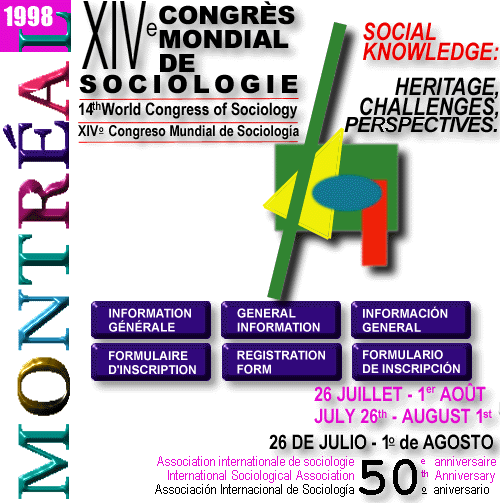International Sociological Association
XIV World Congress of Sociology
Montréal, Québec, Canada, July 26 - August 1, 1998
`Social Knowledge: Heritage, Challenges, Perspectives´
Presentation to the 14th World Congress of Sociology,
WORKING GROUP ON
SOCIOCYBERNETICS AND SOCIAL SYSTEMS (WGO1)
Session 2:
Sociocybernetics and Human Values (Chair: B. Buchanan)
![]()
INFORMATION REQUIREMENTS FOR A
VIABLE WORLD
by Bruce Buchanan
Oral Presentation:
"Welcome Ladies and Gentlemen!
The primary focus in this paper is on the logical and meta-logical requirements for
handling the information needed for the guidance and support of wise social policies. My
thesis is that information dealing with the interrelated problems of the world
Problematique depends crucially upon the systems of which such information forms a part
and on which it depends. The question of adequacy of such information and systems is
therefore crucial.
On this view, prerequisites for providing for adequate information to guide public opinion
will include:
(1) Conscious choice - the articulation and provisional acceptance of meta-level values and ends
(such as, environmental sustainability and human well-being)),
(2) Information processes open to all sources and submissions, without censorship or excessive
noise; this is essential to capture "early warning " signals;
(3) Management of complexity and variety, according to priorities assessed in terms of ongoing
experience; the re-evaluation of criteria must be possible;
(4) Information assessment processes that are open and objective in meeting criteria of verifiability
and consensual validation.
(5) Provision for a mechanism or channel for publication of output, of results of such inquiries and
processing - a regular Letter and reference source - to highlight priority issues in the most
effective ways possible .
(6) Recognize that the band width - the apan of public attention - is limited!
The purpose of such a societal information system cannot be to replace government or
any existing institutions. Nevertheless we do need to provide for supplementary and
countervailing sources. It may be necessary to alert
and bring to the attention of public opinion such events and trends which the
powers-that-be may wish to ignore, without depending upon heroic individuals. Such a
project would entail no more, and no less, than the serious exercise of informed and
responsible free speech. Its proper design could also provide challenges to social
researchers at every level and turn.
To consider what may be the Information Requirements for a Viable World - a living world,
an interdependent existential whole - cannot be a simple task. We have tools to deal with
complexity, and relevant research is growing. Clearly the processes we need must take
cybernetic principles - such as requisite variety, evaluative criteria and relevant,
targetted feedback - into account. The methods and principles also involve higher logical
levels and metalanguage needed to talk about and manage the complexities entailed.
If the larger systems of world governance are to function with coherence they probably
need, in analogy with the brain, supportive meta-systems. The human brain has
specialized systems such as the Reticular Acritivating
system) in addition to those used for intellectual analysis, and these help provide for
relevance and efficiencies by priorizing and shaping sensory input and motor outputs. Such
mechanisms allow for more subtle perceptions, even prior to abstract thought, to modify
gross simplifications. Similar mechanisms are needed to overcome automatisms of unthinking
habit.
This discussion may touch upon a few assumptions which may be unfamiliar : e.g.
First. Specific facts cannot be really understood in isolation. Context must be
established. Major problems and blocks to understanding may be really
meta-level issues of organization and misperception of relationships.
Second. An effective strategy requires a comprehensive, systematic approach. Thus
any plan we can make depends very much on some specific organization.
Third. Reality is, for us, partly a construction from the materials of human exper-
ience, shaped by expectations, and needs. What we perceive is partly us.
Fourth. Choices involve real responsibility, with consequences of ethical concern,
and are not merely dictated by facts or circumstances.
Decisions as to 'What is important?' depend upon criteria which can and
should be articulated at higher or meta- logical levels until their grounds are identified
in the actualities of the encompassing situation - the" real world" e.g. of
Beer's Viable Systems Model. Elucidating 'What is important' must therefore be an ongoing
program which involves cybernetic principles of recursive evaluation and feedback
guidance. This is the underlying pupose of what may be called a Civil Commons Information
System.
There are many who identify world problems specifically with expanding populations,
dwindling natural resources and habitats, and so on. The deeper problem is that all of
these issues are interrelated and depend upon self- confirming systems of belief, and that
a strategy is required for uncovering and moving beyond such blockages to clear perception
and thought.
We need an organization which links those with possibly important information to others,
whom it may concern, including professionals and those with relevant experience. Moreover
this identification and assessment of societal problems and programs is a continuous taks.
A suitable metalanguage and system design at its own logical level is required for this,
to avoid any dependence upon particular individuals or groups or possibility of arbitrary
powers. Such a system would draw upon changing constellations of infomed individuals in
flexible networks, utilizing
modern technologies, evaluated and changing over time as required for continuing
relevance.
Perceived authority would lie - as for science - in the results and the integrity of the
processes themselves, not on pronouncements of individuals or groups as such. There is no
need for a single control centre in such distributed systems.
This in itself may require a wrenching readjustment of thought by those who look to great
men or powerful social classes for answers to great societal problems - an expectation
doomed in principle, and almost always in practice - except where the leader himself rises
above such a narrow role.
Without proper organization, life ceases. Without brains and communication there can be no
learning. Our societies have systems of governance but it is evident that these are
in trouble. While many reasons may be adduced, our concern here is with the most
fundamental - values, goals, information and steering mechanisms. Inadequacies at this
meta level make many specific failings inevitable.
In general, non-governmental agencies lack the power and coordination to provide for the
whole, and would be suspected of imperial ambitions if they tried. Only in cybernetics do
we have the conceptual and scientific tools to deal with logical levels and evaluative
criteria grounded in objective requirements for adaptation in open systems.
Now, such general requirements need to come together in possible specific forms, and I
attempt in the paper to describe how this might be done.
The first task is to describe the processes and structures which are necessary. There is
need to support a contin- uing process capable of receiving and assessing data from all
sources, and of reducing this variety to manageable proportions. How should such
informational variety be reduced, ordered and presented for behavioral impact? The most
appropriate procedures for such processing is a research task, but one that can draw upon
many prece- dents, from Delphi techniques to Beer's Team Syntegrity . Whatever the
technique, a set of priorized issues and relevant information would be produced,
statements of the high profile problems which are most in need of public attention at the
time.
The development of suitable processes would be an ongoing challenge. There would be a need
for contributions from many disciplines, and there are inherent incentives for specialized
contributors to see their efforts in the larger context - that universality of concern
which is a key value of academic freedom. The need is for some strategic organization and
focus, to light a spark. Positve feedback can ignite immense powers. Prerequisites would
be the confidence of respected persons in the possibilities of such a program, which might
justify the modicum of disinterested financial support necessary.
For the general public, and those for whom a cybernetic rationale carries little weight,
the advantages of such a program may be found in its objectivity and transparency. In his
Platform for Change, Stafford Beer has described in various ways the need and
possibilities for such methods as are required by societal systems that would retain human
freedoms.
The complexities of the real world are outrunning the strategies and capacities of those
in power to govern. There seem to be no realistic alternatives to applying cybernetic
principles to societal organization. Perhaps the time has come to make more
deliberate and effective use of such insights in the design of experimenal adjuncts in
support of the Civil Commons.
We need to simplify, to reduce vaiety in ways consistent with our best values.
* In education we need to focus on individual student learnings.
* In health care we need to focus on patient care needs.
* Bankers need a better focus on service of clients.
* In public affairs we need to focus on the well-being of citizens.
Such tasks are not inherently difficult, but can be made impossible by wrong values.
So we must be more continously alert to the influences of the many special interests in an
exclusive pursuit of private profit. We need ways to sort out cover stories and the aims
of spin doctors from the operational facts and results. "By their fruits y shall know
them". The first and most important aim in to transform the norms.
The approach described is perhaps not so much a proposal as it in an invitation to a
conversation on cybernetic strategies. If such ideas make some sense to you, or you know
of similar efforts by others, or you have a suggestion to make, please get in touch with
me.
Thank you for your kind attention."
![]()
go to: THE FULL PAPER, WITH ABSTRACT

